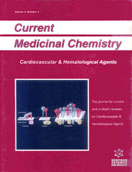Abstract
α2-Antiplasmin (α2AP) is the primary inhibitor of plasmin, a proteinase that digests fibrin, the main component of blood clots. Two forms of α2AP circulate in human plasma: a 464-residue protein with methionine as the aminoterminus (Met-α2AP) and an N-terminally-shortened 452-residue form with asparagine as the amino-terminus (Asn-α2AP). Huma n pla sma α2AP concentration is 1 mM and c onsists of ∼30% Met-α2AP a nd ∼70% Asn-α2AP. The major form (Asn- α2AP) is rapidly crosslinked to fibrin during blood clotting by activated coagulation factor XIII and as a consequence, fibrin becomes more resistant to fibrinolysis. It is apparent that α2AP is important in modulating the effectiveness and persistence of fibrin with respect to its susceptibility to digestion and removal by plasmin. Hence, the physiologic role of α2AP suggests that it may be a useful target for developing more effective treatment of thrombotic diseases. Research on α2AP appears to be moving in two main directions: (1) efforts to use variant forms of α2AP to reduce bleeding secondary to thrombolytic therapy while not slowing thrombolysis; and (2) efforts to use variant forms to diminish the activity of α2AP as a plasmin inhibitor so that fibrinolysis becomes enhanced. Methods to accomplish these two goals mostly involve manipulation of defined functional domains within the molecular structure of α2AP, or inhibition of a newly described novel plasma proteinase, termed antiplasmin-cleaving enzyme, that generates the more favorable form of α2AP, Asn- α2AP, for crosslinking to fibrin. The antiplasmin-cleaving enzyme has similarity in primary structure and catalytic properties to fibroblast activation protein / seprase. This review summarizes recent studies that may hold promise for modulating α2AP activity and its interactions with certain proteins as new therapeutic strategies for preventing and treating thrombotic disorders.
Keywords: antiplasmin, fibrin, factor xiii, plasmin, fibrinolysis, antiplasmin-cleaving enzyme, fibroblast activation protein, seprase
 8
8











